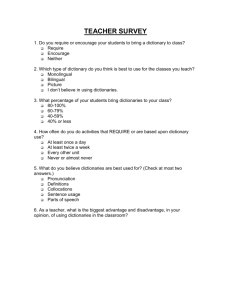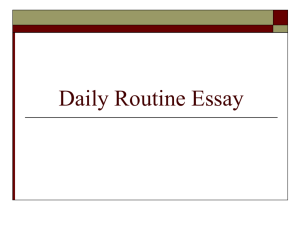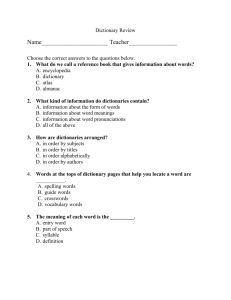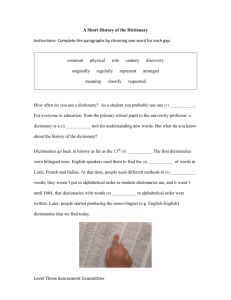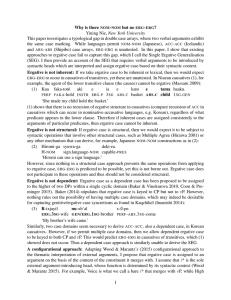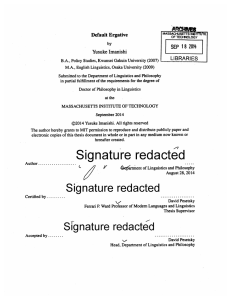Who wants to be a grammar millionaire?
advertisement
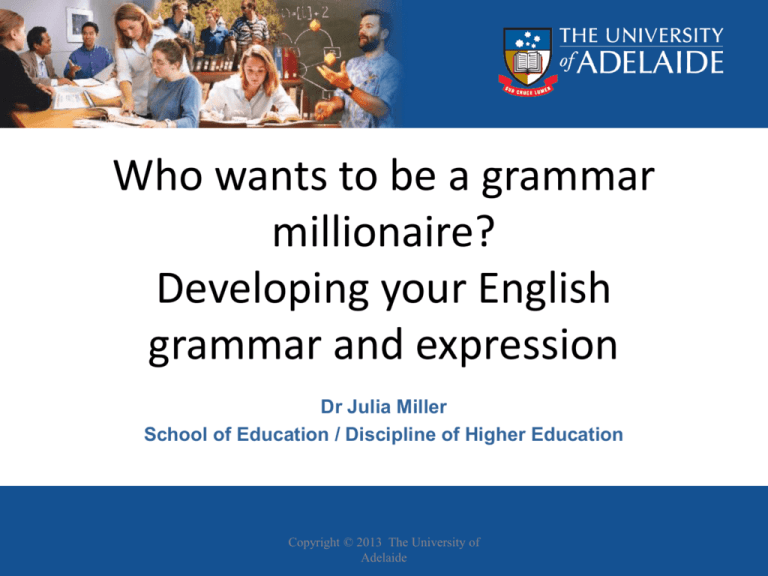
Who wants to be a grammar millionaire? Developing your English grammar and expression Dr Julia Miller School of Education / Discipline of Higher Education Copyright © 2013 The University of Adelaide What is your first/main language? How would you say this sentence in your language? The door opened. Slide 2 Sentence analysed Definite article – the Past simple – opened The door opened. Ergative verb – opened Slide 3 Session outline 1. Articles (a/an/the) 2. Tenses in academic writing 3. The passive voice (and ergative verbs!) 4. Who wants to be a grammar millionaire? 5. Further resources Slide 4 Help! • While you watch, pay attention to the articles (a/an/the) in blue Slide 5 1. Articles: a, the or nothing? What do articles do? • Articles tell us more about how we see nouns in English. • A/An – the first time we use a noun • The – shared knowledge about a noun or the way it is used • 0 – general statements, or another word first (such as ‘my’ or ‘two’) Slide 6 Articles: a, an, the or nothing? Think about your noun. – Is it countable (can you make it plural)? – Is it singular or plural? – Is it definite (both reader and writer know what you are referring to)? e.g. Are you going to the library? Slide 7 Slide 8 Choosing the right article Singular, countable noun Plural or uncountable noun Is it definite? Is it definite? Yes No Yes No the a/an the 0 Slide 9 Is the noun definite? Use the Both writer and reader know what it refers to. e.g I read two articles and a book. The book was very interesting. I went to a wedding last week. The bride looked beautiful. Slide 10 Some advice from Ms Parrot Slide 11 You try! Where would you put articles in Exercise 1 in your handout? How many times would you use ‘the’? English learners’ dictionaries are useful for many purposes, for both native and non-native speakers of English. Most popular five versions of these dictionaries are produced in UK. Most students would benefit from using such dictionary several times day when writing essay. Essay need not be complicated, but using good dictionary will improve quality of anyone’s writing. Slide 12 No article English learners’ dictionaries are useful for many purposes, for both native and non-native speakers of English. Most popular five versions of these dictionaries are produced in UK. Most students would benefit from using such dictionary several times day when writing essay. Essay need not be complicated, but using good dictionary will improve quality of anyone’s writing. Slide 13 Indefinite article English learners’ dictionaries are useful for many purposes, for both native and non-native speakers of English. Most popular five versions of these dictionaries are produced in UK. Most students would benefit from using such a dictionary several times a day when writing an essay. Essay need not be complicated, but using a good dictionary will improve quality of anyone’s writing. Slide 14 Definite article English learners’ dictionaries are useful for many purposes, for both native and non-native speakers of English. The most popular five versions of these dictionaries are produced in the UK. Most students would benefit from using such a dictionary several times a day when writing an essay. The essay need not be complicated, but using a good dictionary will improve the quality of anyone’s writing. Slide 15 The missing articles English learners’ dictionaries are useful for many purposes, for both native and non-native speakers of English. The most popular five versions of these dictionaries are produced in the UK. Most students would benefit from using such a dictionary several times a day when writing an essay. The essay need not be complicated, but using a good dictionary will improve the quality of anyone’s writing. Slide 16 Choosing the right article – reminder Singular, countable noun Is it definite? Yes No the a/an Plural or uncountable noun Is it definite? Yes the No 0 Slide 17 2. Verb tenses in academic writing • Present simple – opinions and findings • Past simple – finished actions • Present perfect – findings that are still relevant; no date Slide 18 Use the present tense to explain or discuss current knowledge Continuing objectives e.g. This study aims to ... General principles or laws e.g. Ohm’s law states that ... Data or findings e.g. These results indicate ... Opinion (even when expressed in the past) e.g. Brown (1997) claims that ... Habitual state or action e.g. Water boils at 100C. Slide 19 Use the past simple tense to describe what previous researchers did or thought (but perhaps no longer think) Past objectives and actions The study aimed to ... The interviews were held ... The researchers found that ... What people used to think It was believed for many years that ... Smith (1987) maintained that ... but later revised his opinion. Slide 20 Use the present perfect tense to show the current relevance of research Research conducted in the recent past and still important now Recent studies have indicated that this is no longer the case. Views held in the past and still held This has been a key issue for many years. Adapted from Winckel & Hart 2002, Swales & Feak 1994 and CALLR 2001 Slide 21 Which tense? Can you put these verbs from Exercise 2 in your handout into the correct tense? In Smith’s experiment (2006), the researchers (heat) the liquid in a test tube. - In Smith’s experiment (2006), the researchers heated the liquid in a test tube. Smith (2006) (maintain) that ... - Smith (2006) maintains that ... Slide 22 More examples Researchers (prove) that chocolate is good for our health. - Researchers have proved recently that chocolate is good for our health. - Researchers proved in 1998 that chocolate is good for our health. Slide 23 Which tense (more examples)? Shakespeare (say) that not all that glitters is gold. - Shakespeare says that not all that glitters is gold. Jones et al. (conduct) the first experiment in 2002. - Jones et al. conducted the first experiment in 2002. Researchers already (try) to replicate the results. - Researchers have already tried to replicate the results. Slide 24 3. Passives http://www.adelaide.edu.au/english-for-uni/passive-voice/ Slide 25 Stolen What part of speech is ‘stolen’? • The past participle of ‘to steal’ Someone has stolen my necklace. • My necklace has been stolen. Slide 26 Passives need the verb ‘to be’ and a past participle What’s wrong here? 1. The new living experiences they want to have could be vary for each person. 2. Australia is well knowing as a multicultural country. 3. It has recognized that Australia is a well developed country. 1. The new living experiences they want to have could vary for each person – active – no verb ‘to be’ 2. Australia is well known as a multicultural country – passive 3. It has been/is recognized that Australia is a well developed country – passive Active to passive Prince Wolfgang gave it to me. • It was given to me by Prince Wolfgang. Someone has stolen my necklace. • My necklace has been stolen. Slide 28 Now watch the video and look out for passives • Bobby Dylan: It’s my table and I’m looking for my necklace. It’s been stolen. It was given to me by Prince Wolfgang. • Kareena Kapadia: My necklace has been stolen, and my necklace was given to me by Prince Wolfgang! Slide 29 Other passive constructions • She went out to have her nails manicured. • Both necklaces got covered by a napkin. Slide 30 Ergative verbs – Middle voice Someone broke the window. (Active) The window was broken. (Passive) The window broke. (Middle) Examples from the story The train’s speed increased. The door opened. Slide 32 What is an ergative verb? An ergative verb can be active or passive. e.g. She opened the door. The door was opened. The door opened. Slide 33 Why does it matter? Many people misuse or ignore ergative verbs. e.g. The figures increased. The gap in earnings decreased. Slide 34 Ergative verbs in academic writing Are the verbs in Exercise 3 ergative? http://www.adelaide.edu.au/english-for-uni/passive-voice/ Scroll down for the list of ergative verbs. Slide 35 Exercise 3 Active Passive Ergative verbs James dropped the ball. Peter kicked the ball. The ball was dropped by James. The ball was kicked by Peter. The ball dropped. Peter laughed. X X (We cannot say, *The ball kicked.) X Active Passive Ergative verbs The fire The wood was The wood burned. burned the burned by the wood. fire. Jack coughed. X X Farmers grow crops. The speaker discussed the topic. Crops are grown by farmers. The topic was discussed by the speaker. Crops grow. X Active The revolution happened in 1974. Oswald killed Kennedy. Passive Ergative verbs X X Kennedy was killed by Oswald. X The economy has The gap . . . has The gap . . . has widened the gap been widened by widened. between the rich the economy. and the poor. 4. We need $1,000,000 to save English grammar. Who wants to be a grammar millionaire? $1,000,000 Slide 39 $100 Does this sentence need an article? Some people live there. a) Yes – a (orange) b) Yes – the (blue) c) d) Yes – a and the (pink) Correct answer: c – no articles needed Slide 40 $1,000 Are the articles in this sentence correct? The wheels on the bus go round and round. a) Yes – this is correct b) No – it should be a wheels c) No – it should be round and a round d) No – it should be some of wheels Correct answer: a) Yes – the sentence is correct Slide 41 $4,000 Which tense should the verb be in? Smith (suggest) (1999) that this is true. a) Past simple – suggested b) Present simple – suggests c) Present perfect – has suggested d) Past perfect had suggested – Correct answer: b) Present simple – suggests Slide 42 $8,000 What two words are missing in this sentence? Australian dollar is stronger than American dollar. a) the/a b) a/a c) d) the/the Correct answer: d - The Australian dollar is stronger than the American dollar. Slide 43 $16,000 Is this sentence correct? The liquid chocolate solidified. a) Yes, it’s correct. c) b) No. It should be ‘was solidified’. d) No. It should be ‘was solidified by us. Correct answer: a – It’s correct. Slide 44 $64,000 Is this sentence grammatically correct? Researchers discover recently that everyone likes chocolate. a) No – discovers, likes b) Yes – it’s fine c) No – have discovered, likes d) No – discover, liked Correct answer: c – Researchers have discovered recently that everyone likes chocolate. Slide 45 $132,000 Is this sentence grammatically correct? An university is the good place to study. a) No – An university is a good place to study. b) No – A university is a good place to study. c) Yes – It’s fine. d) No – A university is the good place to study. Correct answer: 2: A university is a good place to study. Slide 46 $200,000 Is this sentence grammatically correct? The number wrote. a) No – It can only be ‘Someone wrote the number’. b) No – It can only be ‘The number was written’. c) Yes – It’s fine. d) No – It can be either ‘Someone wrote the number’ or ‘The number was written. Correct answer: d: ‘Someone wrote the number’ or ‘The number Slide 47 was written’. $250,000 Is this sentence grammatically correct? Some of people in this room don’t like quiz shows! a) No – It can only be Some of the people b) No – It can only be Some people c) Yes – Some of people is correct d) Both – Some of the people and Some people are correct. Correct answer: d: Some of the people/Some people are both correct. Slide 48 $500,000 Is this sentence grammatically correct? France, the United Kingdom, Portugal and the Netherlands are all in Europe. a) No – The France, the United Kingdom, the Portugal, the Netherlands, the Europe b) No – France, United Kingdom, Portugal, Netherlands, Europe c) Yes – It’s fine. d) No – France, the United Kingdom, Portugal, Netherlands, the Europe Correct answer: c – it’s correct Slide 49 $1,000,000 Correct this sentence as necessary: Master (1986) (say) that English article system (be) difficult system to understand. a) Master (1986) says that an English article system was difficult system to understand. c) Master (1986) says that the English article system is a difficult system to understand. b) Master (1986) said that the English article system has been difficult system to understand. d) Master (1986) says that an English article system is the difficult system to understand. Correct answer: c - Master (1986) says that the English article system is a difficult system to understand. Slide 50 $1,000,000 Slide 51 Summary • Articles What should you consider? • Tenses Which tense do you use for – opinions and findings? – finished actions? – recent or still relevant research? • Passives How can you use ergative verbs? Slide 52 5. Further resources • Ms Parrot’s website: www.adelaide.edu.au/english-for-uni • A learners’ dictionary. e.g. http://dictionary.cambridge.org/ • A concordancer http://ec-concord.ied.edu.hk/paraconc/monoconcE.htm • Using English for Academic Purposes http://www.uefap.com/ • RMIT Learning Lab https://www.dlsweb.rmit.edu.au/lsu/ • ESL café http://www.eslcafe.com/grammar.html • University of Adelaide Library Website http://libguides.adelaide.edu.au/esl Slide 53 The Writing Centre Location: Level 3, Hub Central Opening times: Monday – Friday: 10 am – 4 pm Website: www.adelaide.edu.au/writingcentre Slide 54 Time for action! What will you use from this lecture? What was most helpful? Is anything still unclear? Slide 55 References Centre for Applied Language and Literacy Research, Edith Cowan University 2001, Writing a literature review, viewed 15 August 2006, <http://www.ecu.edu.au/ses/research/CALLR/WRITING/tense.html>. Master, PA 1986, Science, medicine and technology: English grammar and technical writing, Prentice-Hall, New Jersey. Swales, JM & Feak, CB 1994, Academic writing for graduate students, The University of Michigan Press, Ann Arbor, Michigan. Winckel, A & Hart, B 2002, Report writing style guide for engineering students, 4th edn, University of South Australia, Adelaide. Slide 56 Thank you. Have a great year! Slide 57

